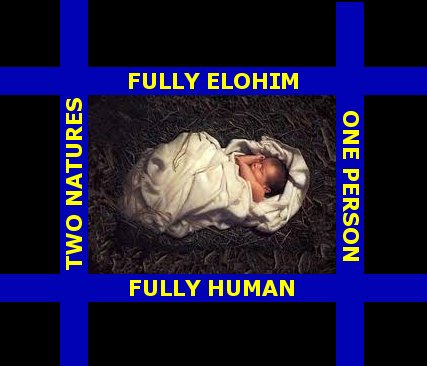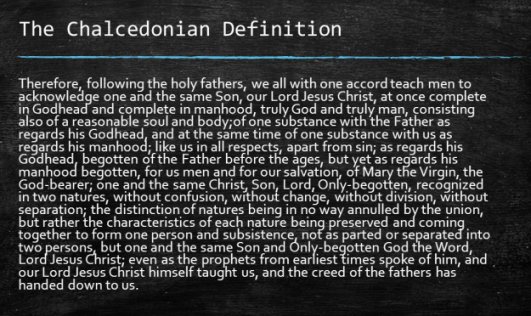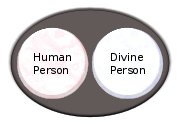Month 8:19, Week 3:4 (Revee/Shavu'ot), Year:Day 5940:225 AM
2Exodus 3/40, Yovel - Year 50/50
Gregorian Calendar: Friday 18 November 2016
The Incarnation
Why It Absolutely Matters

Who Is He?
There is something utterly and exclusively unique about Yah'shua (Jesus). In one sense you can touch and recognise Him, and in another you can't. The centre of our emunah - our faith - is, of course, Christ or Messiah, which is why we call ourselves 'Christian' or 'Messianic' (or ought to). Yet to this day people are still writing books about Him to answer that two thousand year-old question, 'Who was He?' And if you are a believer, 'Who is He?'. The thesis of this study, and therefore obviously my own personal belief, is that He was, and yet remains, both Elohim (God) and man. And that, I suggest, is probably why there will always be a certain mystery about Him.
The Chalcedonian Definition
Christians didn't actually come to a consensus view until as late as the 5th century. Most discussions were calm and reasoned but sometimes they broke out into violence, as in the 5th century in Constantinople (now Istanbul) when two factions, known as 'blues' and 'greens', locked in battle as to whether Yah'shua's (Jesus') nature was one or two. Not until AD 451 did they finally agree in the Chalcedonian Definition that Messiah was both Elohim (God) and Man, "perfect in divinity, perfect in humanity; true Elohim (God) and truly man."

Challenging the Consensus
There have always been, and probably always will be, those who challenge that consensus. The Jehovah's Witnesses believe Messiah was a 'god' with a little 'g'. Mormons believe He is one of several Gods (with a big 'G' - the precise number of these has varied throughout their history from 2 to millions) and increasingly there are Messianics who are denying the divinity of Messiah altogether. There are, in part, etymological (word definition) problems that need to be addressed in any discussion on divinity because not everyone means the same thing by 'Elohim' or 'God'. Finally (to keep the number of examples few), there are the New Age Christians who maintain, as pantheists, that Yah'shua (Jesus) was an ordinary human being who realised His 'Godhood' as must we all.
The Coexistence of Two Natures
There are, additionally, disagreements as to how these two natures - divine and human - co-exist. Are they separate entities or are they all mixed together somehow? Trinitarians come up with a complex philosophical formula called monophysitism which by its very construction cannot be analysed. It remains a 'mystery'. And so it probably always will remain do, though people will debate whether the 'mystery' is of human invention or actually inspired.
The Messianic Evangelical View
We'll obviously not solve that one in one short article but for the record, Messianic Evangelicals have always maintained that the mortal Yah'shua (Jesus) was human in his physical body and Elohim (God) in his uncreated spirit and that these 'mix' or 'interface' in the same way that our physical bodies 'mix' or 'interface' with our finite, created spirits. This 'mix' is not fully apparent until death when the spirit separates from the dead body, returning from whence it came.
Monophysitism vs. Dyophysitism
 Historically there was a doctrine known as dyophysitism which maintained that there were two persons in the Messiah (see diagram) - the one divine and other human. This was the position of the Nestorians who were excommunicated by the Western Church and established their churches for the most part in the East - India and China. This would have made the Saviour schizophrenic, in my view. Nestorianism was opposed to the dominant position in the West known as monophysitism which maintains the two natures were completely and inseparably mixed.
Historically there was a doctrine known as dyophysitism which maintained that there were two persons in the Messiah (see diagram) - the one divine and other human. This was the position of the Nestorians who were excommunicated by the Western Church and established their churches for the most part in the East - India and China. This would have made the Saviour schizophrenic, in my view. Nestorianism was opposed to the dominant position in the West known as monophysitism which maintains the two natures were completely and inseparably mixed.
The Metaphysites
Messianic Evangelicals are monophysite in believing that Yah'shua (Jesus) was one Person with two Natures (divine and human) but we do not accept the notion that these two natures were mixed, as it were, in a 'blender'. Thus we are dyophysite when it comes to the idea of two separate, unmixed or unblended natures which interface in such a way as to appear one nature. Thus I suppose you could call us metaphysites or inbetween the two positions. Complete mixing of body and spirit is the condition known as resurrection wherein the two components are inseparably connected (immortality). Mortality requires a separation of body and spirit so that when the body dies, the spirit is released, rather like withdrawing a hand (spirit) from a glove (body). It is our belief that the spiritual nature resides in the spirit and the carnal or fleshy nature in the physical body and that the two war against each other and appear to be two persons. The fleshy nature is not, however, 'us'. It is satanic in nature and must be resisted and overcome, "crucified in Messiah".
The Pauline Approach
One thing we can all be agreed about is that the incarnation is vital to the Christian/Messianic emunah (faith). Paul alone offers an approach which makes it important that we examine it, first of all from a scholarly Protestant translation which is pretty typical:
"For in Him (Yah'shua/Jesus) all the fullness of Elohim (God) was pleased to dwell, and through Him Elohim (God) was pleased to reconcile to Himself all things, whether on earth or in heaven, by making shalom (peace) through the blood of His cross" (Col.1:19-20, NRSV).
Missing From the Actual Text
The word 'Elohim' or 'God' is not in either the Hebrew, Aramaic or Greek renderings which has led sceptics to question Yah'shua's (Jesus') divinity. However, the reason the word 'God' is inserted is because it really can't mean anything else since what else can "fullness" mean? It can't mean He was 'fully human' as the "fullness" is intensely and joyously personal, not an abstract concept.
Creative Paraphrasing
The literal Greek translation of the original is rather interesting, "...for in Him (Yah'shua/Jesus) the entire compliment (fullness) delights to dwell..." (v.9, CNLT). It's actually quite amusing to see how creative with the text paraphrase translations can get, including this messianic one, "...because haShem (Elohim/God) was pleased that all His fullness have its mishkan (tabernacle, tent) in Moshiach (Messiah)..." (OJB) which is, in effect, to read in what other Pauline passages say about the same or similar topic. Hence my counsel to be wary of paraphrase versions, helpful though they can sometimes be in getting over the original sense in a very different language (English) to the receptor tongue. J.B.Philips' "...it was in Him that the full nature of God chose to live", is a justified example of what I mean, whereas an otherwise good messianic one like the AENT is spoiled by the author's attempt to make direct parallels with kabbalism [1].
No Incarnation, No Salvation
If "in Him (Yah'shua/Jesus) all the fullness of Elohim (God) was pleased to dwell" (ESV, NRSV) is not true then I have to agree with George Carey who states emphatically and accurately, in my view, "that we cannot know how to be saved, how to live nor how to think about God (Elohim). We are left to struggle to do our best in the uncertain hope that God (Elohim) will accept us in the end" [2]. I am quite sure that this is why liberals and atheists constantly have in their sites the undermining and destruction of the Incarnation and Deity of Messiah, more so than any other teaching in either Christianity or in any other religion. That observation itself ought to make us sit up and take note.
The New Testament Emphasis
There is, fortunately, no dispute (except amongst certain Gnostics) over the fact that Yah'shua (Jesus) was a male human being whose cultural outlook was that of first century Palestine. His historical contemporaries also recognised this (Mk.6:3; Jn.42). That being universally accepted, we have to focus on what the Messianic Scriptures (New Testament) say because the emphasis there is almost entirely on his divinity [3], his manhood being observed through His life and behaviour.
The Great Offence
Yah'shua's (Jesus') humanity is important to the salvation message because of the way it joins Him to us, enabling Him to fully identify with our predicament as a human being Himself. However, to diminish or discount His divinity altogether is the great error of liberalism and secularism. The idea of Elohim (God) becoming incarnate is not, I suggest, the major issue, for such a doctrine is commonplace in the polytheism of Hinduism. Where the problem comes is in the idea of a crucified Elohim (God) because such is an offence to the proud, a scandal to the religious and foolish to those who consider themselves 'wise'. For one, this makes Yah'shua (Jesus) unique, summarily dismissing the claims of all the other 'gods', none of whom ever died for anyone and certainly not bringing the offer of eternal chayim (life).
What Incarnation Will Lead You to Do
For another - and this is so important - the doctrine of the incarnation drives Yahweh's people to go to the world's end, and to other frontiers of need and despair, for the love of Him who did not count His life dear to Himself. In a parallel way, one which we are called to imitate on our own human level, Yah'shua (Jesus) Himself was driven by the great ahavah (love) of Elohim (God) to the lonely frontier of separation from His Father and His friends. Our religion is one of imitation: "As the Father has sent Me, I am sending you" (John 20:21, NIV). When we imitate Him, we bring forth ahavah (love) and present salvation. The Islamic religion, by contrast, calls for imitation of its founder, and that brings forth ISIS - hatred and death.
Conclusion
The Messianic Evangelical view of the Incarnation is the classical one - it cannot be anything else. If we don't embrace the incarnation, we can't even start our witness. Then our message would be dead, as it is in the hands of so many liberal Christians infected by secularism and messianics infected by Talmudic Judaism. It doesn't mean that we have to buy into the minutae of the classical creeds about the Elohimhead/Godhead but it does mean we must not throw out the baby with the bathwater. Elohim (God) became man in Yah'shua the Messiah (Jesus Christ) we absolutely and unapologetically affirm and declare doctrines that contradict it to be anathema. No Incarnation, no Salvation. It boils down to that.
Endnotes
[1] Andrew Gabriel Roth, Aramaic English New Testament (Netzari Press LLC, USA: 2012), pp.600-601, footnote #4
[2] George Carey, God Incarnate (Inter Varsity Press, Leicester, England: 1977), pp.5-6 - this 64 page-long booklet is worth owning, being a response John Hick's infamous book, The Myth of God Incarnate, which did considerable damage at the time (1977). George Carey was a humble Anglican Vicar when he wrote his booklet and would one day become the Archboshop of Canterbury (1991-2002). He was hated by the secular liberal establishment not withstanding he was liberal in one or two areas, notably with regard to divorce and in his ecumenical ties with Rome. But because of his staunch evangelicalism, be became, to his credit, "the most excoriated archbishop since the execution of Charles Iís favourite, William Laud". I suspect the hostility from the left-wing establishment came from the way he dealt with Moslems. Neveretheless had he been heeded, much sorrow in our own day might have been averted. As Archbishop of Canterbury, he was active in inter-faith work and worked for better relations with Moslems, calling for "deeper dialogue" between the two faiths. On 25 March 2004, after his retirement, he made a speech lamenting the lack of democracy and innovation in Moslem countries, suggesting a lack of critical scholarship toward the Qur'an and saying that moderate Moslems should "resist strongly" the take-over of Islam by extremists. He also criticised the majority of Moslems, who do not support extremists, for not denouncing them. In September 2006, he declared that "there will be no significant material and economic progress [in Moslem communities] until the Moslem mind is allowed to challenge the status quo of Moslem conventions and even their most cherished shibboleths."
[3] Unless you're an Ebionite or Anti-Paulist as some messianics, sadly, have become in which case a valuable witness to Yah'shua's (Jesus') divinity is lost

|


